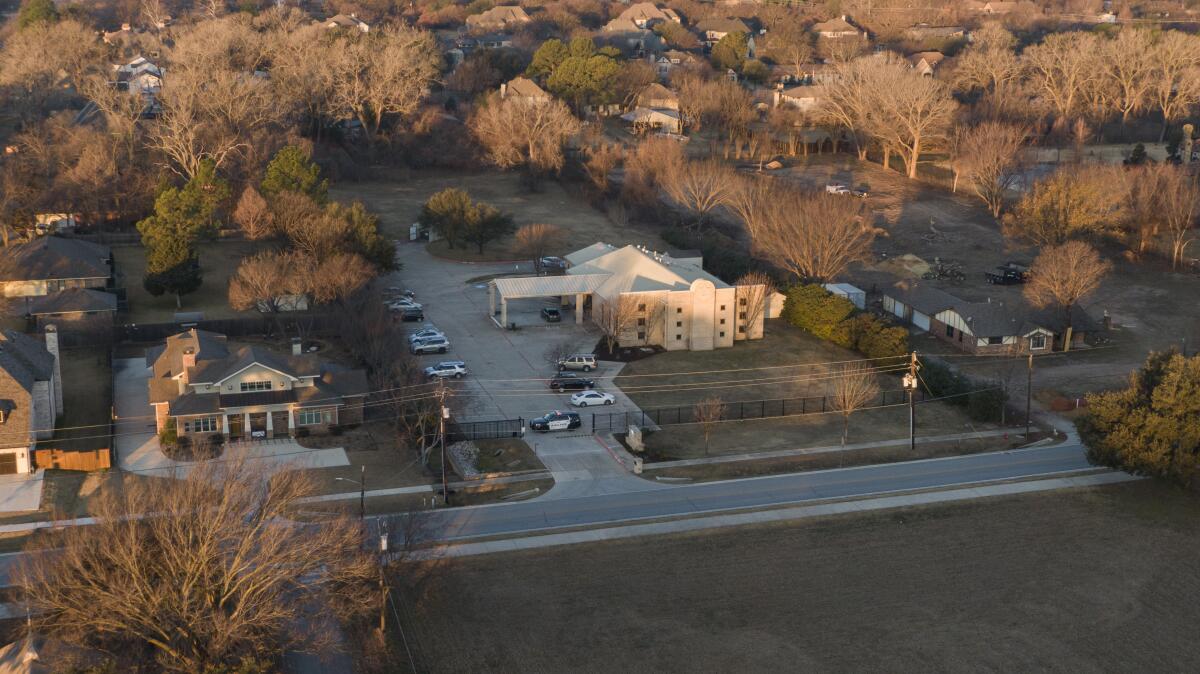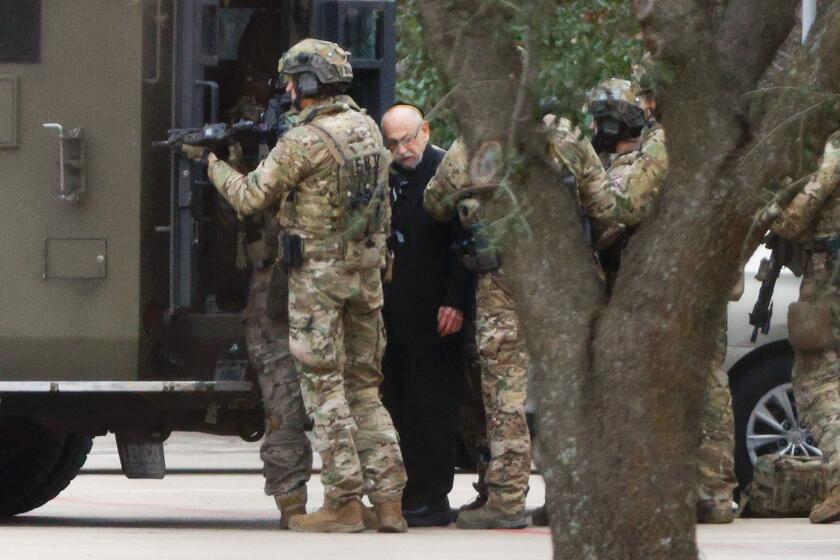The Texas hostage-taking was a symptom of conspiracy theories run amok

- Share via
On Saturday, an armed 44-year-old British man, a Muslim, stormed into Congregation Beth Israel synagogue in Colleyville, Texas, and demanded the release of Aafia Siddiqui, a Pakistani serving an 86-year sentence in a nearby federal prison on terrorism-related charges.
We don’t know everything there is to know about the four people whom Malik Faisal Akram held hostage. But I am certain the 11-hour ordeal — which ended with the hostages safe and Akram dead — left them terrified.
And I can also promise you this: Not one of those four hostages had anything to do with Siddiqui.
The rabbi of a Texas synagogue says he threw a chair at the gunman and then escaped with two other hostages after 10-hour standoff.
Siddiqui was tried and convicted for grabbing a carbine and shooting at U.S. service members while under arrest in Afghanistan in 2008. Considering why a British Muslim might threaten the lives of four Texas Jews in 2022 for the actions of a Pakistani in Afghanistan in 2008 tells you a lot about the poisonous reach of antisemitic conspiracy theories and the need to call out and stop them.
Karachi-born Siddiqui, 49, came from an educated, devout Muslim family. She won entrance to the Massachusetts Institute of Technology and, in 1995, went on to obtain an advanced degree in cognitive neuroscience at Brandeis University, a nondenominational liberal arts college founded in 1948 by the Jewish community where 44% of undergraduates identify as Jewish.
At Brandeis, Siddiqui brought her religion into her scientific work, concerning her professors. After the 9/11 attacks, she left the U.S. for Pakistan and Afghanistan. By then, she reportedly had already come to the attention of U.S. authorities.
In 2008, Afghanistan police arrested her. She was carrying documents on making explosives, along with descriptions of the Statue of Liberty, Empire State Building and other New York City landmarks. During an interrogation, Siddiqui grabbed a rifle and shot at her captors and questioners.
Before her 2009 trial for the shooting, Siddiqui tried to dismiss her lawyers because of their Jewish background and demanded that prospective jurors undergo DNA testing to determine if they had Jewish genes.
“Study the history of the Jews,” she wrote in a plea to then-President Obama. “They have always back-stabbed everyone who has taken pity on them and made the ‘fatal’ error of giving them shelter.” She added: “This why ‘holocausts’ keep happening to them repeatedly! If they would only learn to be grateful and change their behavior!!”
The Texas synagogue standoff is a reminder to follow the Jewish imperative to “hope far ahead,” to work for change even if we won’t be here to see it.
A defense psychologist claimed that Siddiqui’s antisemitism was proof of her delusion.
“Her beliefs that Israel, the United States and India are conspiring to invade Pakistan, that Jews are responsible for 9/11 and have infiltrated American political and nongovernmental organizations” said the psychologist, Thomas Kucharski, indicated that she was not fit to stand trial.
But in truth, antisemitic conspiracy theories dominate Pakistani textbooks, media and government. Why would Siddiqui believe anything else?
In May, Pakistan’s top diplomat invoked the myth of global Jewish financial and media control on CNN. He told a CNN anchor that Israel was “losing the media war” over its policies in Gaza, “despite their connections.”
“What are their connections?” he was asked.
“Deep pockets. ... They are very influential people. I mean, they control media.”
When an FBI spokesman said after the hostage-taking in Texas that the standoff was “not specifically related to Jewish community” — a statement that made headlines and deeply upset many Jews — it was both right and wrong. The Jews have nothing to do with Siddiqui, but in minds twisted by antisemitic hate, they have everything to do with her. Once again, Jews became the real-life victims based on utter fictions.
Those fictions are particularly dangerous when they swirl about in unstable minds. The brother of Akram, the hostage-taker, claimed he had “mental health issues,” and Siddiqui’s lawyer once describer her as in “total psychic pain.” That may explain their actions, but it doesn’t explain the regurgitation of these theories, in some form or other, by those who can make no such excuses.
Crackpot theories about Jews abound in the Muslim world and in the darker corners of the non-Muslim world as well.
“We blame the Jews for everything,” an Egyptian journalist once told me. “It’s like a joke.”
Antisemitic rants can seem like a joke. Who can take seriously Rep. Marjorie Taylor Greene’s tweet about Jewish space lasers causing California wildfires, or a Utah tech CEO’s email that Jews developed the COVID-19 vaccines to kill billions of people?
But when synagogues are attacked, it’s clear these “jokes” aren’t funny. The man who opened fire and killed a woman in a Poway, Calif., synagogue in 2019 and the white supremacist who killed 11 people in a Pittsburgh synagogue six months earlier both believed the antisemitic claptrap they read online.
A gunman armed with a semiautomatic rifle walked into a suburban San Diego County synagogue and opened fire on the congregation Saturday, killing one person and injuring three in an attack that authorities believe was motivated by hate.
“HOUSTON, WE HAVE A PROBLEM!” tweeted Abdullah T. Antepli, a public policy and divinity school professor at Duke University, and Duke’s former Muslim chaplain, in a much-circulated thread over the weekend. “Yes, we Muslims living North America undeniably have an increasing anti-Semitism problem and seemingly we have yet to even begin to address the issue honestly, morally and accurately.”
“We MUST! Without ands and buts, without any further denial, dismissal and or trivializing of the issues. We need to honestly discuss the increasing anti-Semitism within various Muslim communities.”
“Somebody might think that they’re just making a comment or just making a joke,” Congregation Beth Israel’s Rabbi Charlie Cytron-Walker, one of the hostages in Colleyville, told a reporter. “Unfortunately, someone, somewhere, is going to take that hatred, and they’re going to go to a dangerous place with it.”
Sorry to say, the rabbi knows what he’s talking about.
Rob Eshman is the national editor of the Forward and writes its weekly “Letter from California.”
More to Read
A cure for the common opinion
Get thought-provoking perspectives with our weekly newsletter.
You may occasionally receive promotional content from the Los Angeles Times.











